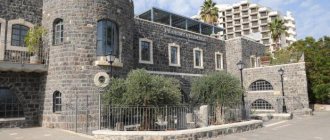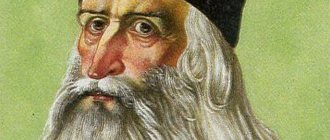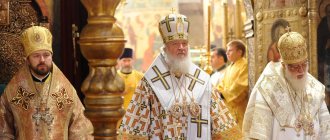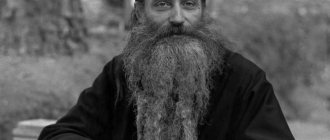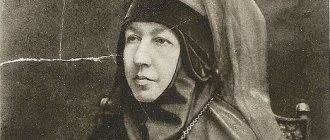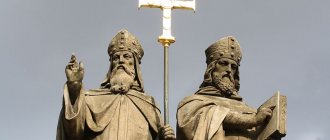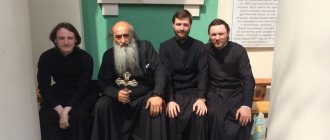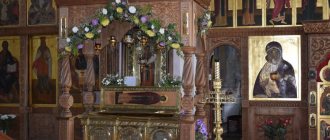| Abbess Georgiy (Shchukin). Photo from the official website of the Russian Spiritual Mission in Jerusalem of the Moscow Patriarchate |
Georgia (Shchukina)
(1931 - 2022), abbess, honorary abbess of the Gornensky Kazan Monastery in Jerusalem In the world, Valentina Shchukina, was born on November 14, 1931 in Leningrad. During her infancy, her father went missing - her mother searched for him for a long time and unsuccessfully, and in 1936 she remarried. My stepfather worked at the Hermitage. She was the eldest of three daughters in the family.
During the Great Patriotic War she survived the siege of Leningrad. At this time, my stepfather died of illness. In 1942, the mother and three daughters were evacuated. All of them were extremely weakened and on the way, in Orekhovo-Zuyevo, the mother handed over Valentina and Nina, the youngest daughter, to doctors, because it seemed that both died on the road - they were lying unconscious, severely frostbitten. Nina died, and Valentina was released, although due to frostbite her toes on her right foot had to be amputated. She spent about three months in the hospital, after which she was discharged and after several weeks of moving and searching, she found her mother who had evacuated to the Krasnodar Territory, Kuban. Here the family had to survive the fascist occupation, and then a typhus epidemic, from which the mother died.
After a stay in an orphanage, the search for relatives led back to Leningrad, to his mother’s sister, Matryona Stepanovna, who sheltered the orphaned Valentina and Lydia.
From the age of 14, she first worked in a canteen near the Finland Station, where she was forced to weigh people, which is why she quickly left this job. Then she got a job as a restorer at the Central Historical Archives, where the work was strong and successful.
The entire extended family was believer. Aunt had at home the Bible and the Lives of Saints of St. Demetrius of Rostov, which Valentina read aloud; I visited city churches where I especially loved singing akathists. After heartfelt sermons from priests in churches, at the age of 15, I decided to embark on the monastic path of salvation. When Abbess Raphaila arrived in Leningrad from the Pyukhtitsa Assumption Monastery, Valentina asked her to enter the monastery, and received an invitation to come. In 1948 and 1949, she twice visited St. Seraphim Vyritsky, who blessed her to become a monk. Aunt Matryona initially resisted, but after she also met Saint Seraphim, she let her go. It was difficult to leave work.
| Nun Georgia (Shchukina). Photo from the official website of the Russian Spiritual Mission in Jerusalem of the Moscow Patriarchate |
Monastic path in the USSR
In the spring of 1949, she came to the Pyukhtitsa Assumption Monastery with her cousin Nina, who later became nun Arsenia there. At the Pukhtitsa monastery she served as treasurer and choir director, assisted Abbess Varvara and served as cell attendant.
From 1955 to 1968 - nun of the Vilna Monastery.
On April 7, 1968, she took monastic vows in Pyukhtitsy, where she continued to strive until 1989.
In 1989, she was appointed to the newly established Ioannovsky metochion of the Pyukhtitsa Monastery in Leningrad - the revived Ioannovsky Monastery on Karpovka. Being the eldest sister, she worked on the restoration of the monastery church - the roof was repaired, domes and crosses were installed, the restoration of the upper church and the restoration of the chambers of St. John of Kronstadt began. The grave of the righteous priest was also found.
Abbess in the Holy Land
On January 30, 1991, she was appointed abbess of the Gornensky Monastery in Jerusalem [1]. Before this, Father Nikolai Guryanov had predicted her abbess in Jerusalem more than once. When called to a new ministry, Patriarch Alexy II of Moscow and All Rus' instructed her to receive pilgrims, repair and restore the monastery, and also prepare a replacement for herself there. On March 24 of the same year she was elevated to the rank of abbess in the Moscow Elokhov Cathedral, and on March 27 she flew to the Holy Land.
When I arrived at the Gornensky Monastery, there had been no abbess there for five years, and the monastery had not been renovated for a long time. The cell houses were old and poorly equipped; there was no fence around the monastery territory, no running water, no telephones, no good hotels for pilgrims. Under Abbess George, the monastery entered a new period, henceforth becoming an important center for receiving pilgrims. In 2003-2007, the main cathedral of the monastery, begun a century ago, was finally completed.
On March 11, 2022, she was released from the abbotship for health reasons, with an expression of gratitude for many years of diligent and zealous work to create monastic life, and was appointed honorary abbess of the Gornensky Monastery [2].
She died on February 6, 2022, after a long illness [3].
Abbess Georgiy (Shchukina): Three steps to the Kingdom of Heaven
This short conversation, recorded in January 2013 in Tbilisi during the celebrations of His Holiness Patriarch Ilia II, just before the return of Mother Georgia to the Holy Land, contained a lot: her childhood memories of the horrors of the blockade, a story about meetings with the holy elder Seraphim Vyritsky, a testimony about how the opening of the Ioannovsky Monastery in Leningrad took place, thoughts about faith, the Church and the providence of God in life.
Abbess Georgia (Shchukina), abbess of the Gornensky convent in Ein Karem
Abbess Georgia, known as Valentina Shchukina, was born on November 14, 1931 in Leningrad. During the Great Patriotic War she survived the siege of Leningrad and the loss of her parents. From the age of 14, Valentina worked first in a canteen near the Finlyandsky Station, and then as a restorer at the Central Historical Archive. In 1949 she entered the Holy Dormition Pyukhtitsa Monastery. From 1955 to 1968, nun at the Vilna Monastery in Lithuania. Monastic tonsure took place on April 7, 1968 in Pyukhtitsy. Since 1989, she has been assigned to the restoration of the monastery of St. John of Kronstadt on Karpovka in St. Petersburg. On March 24, 1991, she was elevated to the rank of abbess. In 1992, His Holiness Patriarch Alexy II of Moscow and All Rus' was appointed abbess of the Gornensky convent in Jerusalem.
— Mother George, you lived a long life in the Church. What is the key to a happy, so to speak, Christian life?
“The main thing is that we are Orthodox Christians, and we have a true, pure Orthodox faith. We go to church, pray, fast, and receive communion. The Lord came to earth to save man, and He gave everything for man. Just don’t be lazy, don’t relax! Unfortunately, not everyone follows the right path. Many people are fascinated by social life. But we need to think more seriously about the fact that everything here is temporary: joys, sorrows, and illnesses - they will pass. Everything eternal is there: what we earn, we get.
In the Pyukhtitsa Holy Dormition Monastery
In a monastery, the main thing is obedience, it is higher than fasting and prayer. I came to Pyukhtitsa at the age of 17, in 1949. There we lived in the same cell with mother Arkadia from Kronstadt, the spiritual daughter of Father John of Kronstadt (with his blessing the Pyukhtitsky monastery was built). So he said to the sisters: “Sisters, just obey without complaint, and you are three steps away from the Kingdom of Heaven.”
But now is a different time, the spirit of monasticism is different, the youth is different. Previously, people went to the monastery to serve the Lord, but now some go to arrange their lives, solve the problem of housing, that is, without a calling. That’s why “I can’t” and “this is not my obedience.” The one who comes with a calling does everything without complaint.
Awards
- Order of the Russian Orthodox Church Equal to the Apostles. Princess Olga 3rd degree (to the 50th anniversary of the DECR, 1996)
- Order of the Russian Orthodox Church St. Sergius of Radonezh, 3rd degree (to the 150th anniversary of the RSM in Jerusalem, 1997)
- Order of the Russian Orthodox Church Equal to the Apostles. Princess Olga 2nd degree (to the 2000th anniversary of the Nativity of Christ, 2000)
- Order of the Russian Orthodox Church St. Sergius of Radonezh, 2nd degree (on the 70th anniversary of his birth, 2001)
- Patriarchal charter (for the 60th anniversary of the DECR, 2006)
- Patriarchal charter (for the 160th anniversary of the RSM in Jerusalem, 2007)
- Patriarchal Cross (2011)
- Order of the Belarusian Exarchate of the St. Cross Euphrosyne of Polotsk, 1st degree (2011)
Servant of the Mother of God
In 1949, we didn’t have a single laborer or a single male worker. There are few sisters, almost no young people, and fields, barnyards, hard physical work. We plowed, and harrowed, and sowed, and mowed, and baked bread by hand, kneaded the dough in a trough, rolled it out, and then there were red spots on our hands. And the thought never arose: “I wish it would be easier.” The Pukhtitsa sisters set a good example for everyone who came.
Image of the Pyukhtitsa Mother of God “At the Source”
One nun, Mother Iraida, now deceased, a senior prosphora girl, came to Pyukhtitsa at the age of 14, as a girl. And she told me how a beautiful Woman appeared to her in a dream and asked: “Daughter Irina, do you want to be My servant and live in My house?” She looked at Her: “Yes, I want to.” The Mother of God put her hand on her head, said “come” and disappeared. And when I heard this story of Mother Iraida, I thought every time that I, too, lived in the house of the Mother of God, and I, too, was Her servant.
How did Abbess Georgiy die?
On February 6, 2022, Abbess Feofan Mikhailov, President of the New Jerusalem Foundation, announced the death of Abbess Georgiy.
Similar news What to do if the seedlings stretch upward and become thin, why does this happen
“Half an hour ago, at 19:45, our beloved mother Abbess Georgia (Shchukina), honorary abbess of the Gornensky Monastery in Jerusalem, went to the Lord. I ask, dear friends, your holy prayers for his repose. And she will definitely pray for all of us in Heavenly Jerusalem! The Kingdom of Heaven, dear Mother George! wrote on Facebook.
Abbess George. Photo source: Pavel Belobritsky
Blockade: “The Lord allowed me to rise again”
—Has the Mother of God shown a miracle in your life?
- Miracle?! I am not worthy... It was a miracle that I remained alive, the Lord and the Mother of God helped me. I was already in the morgue, and everyone thought that I had died. The blockade is a terrible time, this happened all around! One day my mother’s friend came. And on our chest of drawers were bread cards (for each one we were given 125 grams of bread). She took them. There is one card left for everyone. This knocked us down. Dad is dead. Mom couldn’t even get up, and he lay in the hallway for almost a week - everyone in the apartment died out, there was no one to take him out.
I, the eldest of the children, went for water and bread. Once, while the bread was being weighed, an adult man grabbed it through me, others began to pinch off a piece from him, and so they ate it all. And soldiers lived in our house. They saw that I was returning without bread and crying. And one of the basement beckons to me: “Why are you crying?” I answer: “They took the bread off my scale!” And he gave me a few pieces of his.
Then we were evacuated along the “road of life” across Lake Ladoga. In Orekhovo-Zuevo, my mother handed me and Ninochka, my younger sister, over to the doctors. They took me unconscious to the morgue. I only woke up in the hospital. And Ninochka remained there lying in mass graves.
- Who noticed that you were alive?
- Doctors, probably. Orderlies entered our train at each station, because the mortality rate began to be higher than in Leningrad. On the way to the train, local residents came, brought food, wanted to help, hungry people pounced on bread, and their bodies could not stand it. People were carried out of the carriages half-dead and checked.
The Lord gave me to “resurrect.” The frostbitten toes on my right leg were amputated. I spent three months in Orekhovo-Zuevo. And then one day the head physician came into our department: “Tomorrow morning we are discharging 40 people.” I cried: it’s unknown where they’ll take me! But I want to go to my mother, where she is, I don’t know. And here is the providence of God: in the evening the duty officer brought an envelope addressed to the head physician from her mother. In the letter she asked if such and such a girl was alive, and the return address was indicated: Krasnodar Territory, Tikhoretskaya (either a village, or a station).
The next day I was sent by train, entrusted to the conductor, to my mother. I passed my station. They brought me to Krasnodar and put me in a children's room, fed me, and put me to bed. In the morning they put me on the train again, and again I passed the station, can you imagine?
- How could a small child endure all this?!
- And like this. It’s already May, it’s warm outside, but I’m wearing all my winter clothes, it’s hot, my leg hurts, I’m limping. And now there was a third attempt, already successful. I was put into the carriage again and assigned to the conductor. Everyone came up to me and asked questions (they felt sorry for us Leningraders and brought us food). And then one woman reads my note with the address: “And I’m just going there! My sister lives there.” The conductor was so happy!
We got out of the carriage and rode a horse to the house of my fellow traveler’s sister. They gave me a snack and laid me out on the floor. I lay down completely exhausted and dozed off. I woke up from a noise, it seemed to me that something was falling on me. I open my eyes, my mother is in front of me. It turned out that my mother was settled next to that woman. That's how providential everything was! Such joy, such a meeting!
But the joy quickly ended - the Germans entered Tikhoretskaya. Many went to Germany, where they were promised an apartment and a pretty penny. Soon our partisans surrounded the village and entered not from the side from which the Germans were waiting, but from the other. The Germans retreated. But then a typhus epidemic began, during which my mother fell ill and died at the age of 35. Lidochka and I were left alone. Mom had 7 sisters. They were informed. First, we were brought to Valdai to one of the aunts. But there was a war going on, it was hard to support the two of us, so they sent me to an orphanage. True, I did not stay there long, and in 1944 I returned to Leningrad.
Again in Leningrad
And again, how providential everything is! I was put in the carriage alone. It’s simply amazing: to send a minor girl, a blockade survivor, exhausted, and not provide an accompanying person! For some reason I was kicked off the train. I’m sitting crying, a woman comes up to me and asks what happened. I explain to her that I don’t know myself, that I should go to my mother’s sister... - “Where?” I gave my aunt’s address in Leningrad (she lived on Kuibyshev Street). The woman exclaimed: “Yes? So I live on Kuibyshev. What is the house number? I said everything. She found her aunt in Leningrad and gave everything to her. And they returned me to the orphanage and sent me for the second time with an accompanying person, who brought me to my aunt.
— Have you ever felt resentment toward God for the trials that befell you and your family?
- This has never happened, never.
— When did you want to go to a monastery?
- In 1948. When I lived with Aunt Matryona. The times were such that they hid everything: the Gospel and prayer books. But I read these books from her (all seven of my mother’s sisters, my aunts, were believers). And I went to church - to Nikolsky, to the Mother of God “Quick to Hear” on Okhta, although it was unsafe.
Church in Soviet Leningrad
I really loved singing akathists, and the little voice just appeared. Father will look around and call: “Valya, help me sing.”
And what sermons the priests preached! And His Holiness Patriarch Kirill’s father was a very strong preacher, Father Michael. Then Father Philotheus, Father Alexander. I remember on Christmas day I came to the then newly opened Leningrad Seminary, Father Alexander preached: “Dear brothers and sisters, what a joyful, saving, solemn holiday today is! The Magi brought incense to Christ. What will we bring to God?”
I stand and think: “God, what will I bring to You? I have nothing but sins! Take me yourself!” Such sermons told us that I had a burning desire to go to a monastery. But my aunt didn’t want to let me in: “You’re not going anywhere, you’ll bury me, then go!” But the Lord granted it earlier: in 1949 I entered Pyukhtitsa.
* * *
The Pukhtitsky monastery had a large farm - a barnyard, horses, cows, chickens, fields. And not a single employee! The sisters themselves worked, and there was no equipment; everything was processed by hand.
The abbess received me and said: “Valya, we have a working monastery - we will have to plow, harrow, and go to the forest for mushrooms.” - “Mother, where do you bless! I will do everything for holy obedience!”
I was placed in the cell of nun Arkadia, the spiritual daughter of John of Kronstadt, but was soon transferred to the abbot’s corps as a cell attendant. They immediately put us on the choir, which the sisters were very happy about - there weren’t many singers. But I also performed general obediences with everyone. In those years there was no water, no light, no heating in the monastery. The sisters went to the spring. Firewood was carried from the forest. And they had to be brought to the kitchen, to the refectory, to the church, to the abbot’s building, to the almshouse, to the priest’s house. And they carried everything on themselves.
But then the workers from St. Petersburg left. The first thing we did was install electricity, because the service was going on in the church - it was dark, there was a singer or reader with a candle, and the priest in the altar also had candles. Now there is beauty in Pyukhtitsy. When I went there, the sisters tried to persuade me: “Mother George, come back to us.” To which I replied that I went to Gornenskoye for holy obedience, I didn’t go there myself, but His Holiness Patriarch Alexy II sent me.
Meeting with the holy elder Seraphim Vyritsky
I visited Father Saint Seraphim of Vyritsky twice. Then I often went to St. Nicholas Cathedral and asked everyone to pray that the Lord would soften the heart of my Aunt Motya. The altar mothers advised me to take a blessing from Bishop Alexy (Simansky), the then rector of the cathedral (he later became a metropolitan, then a Patriarch). They took me to him. He accepted, asked who I was, who I live with, how many years I am, what I do. And I asked him: “Vladika, dear, pray that the Lord will soften my aunt’s heart, she will not let me go to the monastery and says that I am still a child and that I cannot leave her and my younger sister.” He advised: “You go to Vyritsa, to see Father Seraphim.”
My mother and I have already told me about him that he is a difficult person and helps everyone a lot. I found out the way and went. This was in the fall of 1949. It turned out to be a fine day, people were sitting on the grass waiting for the priest: some on a chair, some like that. Everyone wrote notes. Father no longer received anyone. His cell attendant, Mother Seraphima, came out, collected notes and handed them to the priest.
Holy Elder Seraphim Vyritsky
I was also told to write to my father. Then Mother Seraphima came out, accepted notes from some, and took me by the hand and led me inside. Everyone stood up: “Mother, we’ve been waiting for so many hours!” One even said that she spent the night here because she really needed to receive the priest’s blessing. Mother Seraphima replied: “Darlings, pray.” I walk in, Lord have mercy, Father Seraphim is lying on the crib (that’s exactly how they portray St. Ambrose of Optina).
I crossed myself, fell to my knees, crying, I couldn’t say anything. He strokes me, blesses me, asks me what my name is. - “Sinful Valentina.” I read it, I know what kind of ascetics there were, but who am I? He asked who I lived with. “Father,” I say, “pray, I really want to go to the monastery!” And he: “Look around, look at the wall.” I looked around, there was a photograph, on it there was a hill, a temple, Pyukhtitsa. “By God come,” he continued. - “Father, my aunt won’t let me in.” - “Let him come to me.” I returned home, I tell him, my aunt doesn’t want to listen: “I won’t go to any Seraphim! Until you bury me, nowhere!”
Valentina Shchukina
I again ask the mothers in churches to pray. And one day I come to St. Vladimir’s Cathedral for an akathist. And the altar mothers call me: “Mother Raphaila has arrived from Pyukhtitsa and will spend the night with us. The Akathist will end, you go up to her, bow down and ask. If you want some tea, drink some tea, and ask properly.” After the akathist, I approached: “Mother, accept me.” She asked about everything and agreed. I go home to Aunt Mota, she is in tears again. She began to beg her again: “Aunt Motya, well, go to Father Seraphim!” And then she already left. She returned from him completely different. I just cried, but I let go. And then in the summer she came to Pyukhtitsa, and she liked it there so much that she completely calmed down.
ABBESS OF ALL THE HOLY LAND In memory of Abbess Georgia (Shchukina). By day 9
Today is the 9th day of the repose of Mother Georgia (Shchukina) in the Lord. Sergei Georgievich Myannik, a member of the Synod of the Estonian Orthodox Church of the Moscow Patriarchate, recalls the ascetic of our days, who once began her monastic path in the Pukhtitsa Dormition Monastery in Estonia.
Mother George (Shchukina)
Special time - special obediences
For the first time I was brought to the Pukhtitsa Assumption Monastery when I was eight months old. So, from childhood, I have the impression that George’s mother was always in Pyukhtitsa. You arrive, and there you are greeted by this kind, sympathetic person. Perhaps, as the abbess, she sometimes had to show sternness, but this was not at all in her character. She was very soft and loving in nature.
Mother George in the Ioannovsky Monastery on Karpovka. At the burial place of the relics of St. right John of Kronstadt
We, of course, immediately worried about everything when Mother Georgia was transferred to St. Petersburg in 1988 to revive the Ioannovsky Monastery on Karpovka. Although, however, everyone understood that some new time was coming in church history when churches and monasteries began to be returned to believers; the relics of saints were found somewhere in the storerooms of museums; the saints began to be glorified again. In the same St. Petersburg, in our memory - blessed Xenia, holy righteous John of Kronstadt, and then the new martyrs - these were all grandiose events for church people - despite the fact that before we could not even imagine anything like this.
The same monastery on Karpovka, when they were already allowed to perform divine services, was simply in a terrible state: everything was destroyed, in the mud, in rubble. Of course, it took some work. And Mother Georgia was from the northern capital; she still had some acquaintances there in the church community. She managed to get this matter of restoring the ruined monastery off the ground. I’ve literally already decorated everything there...
The future His Holiness Alexy (Ridiger) in the Pukhtitsa Monastery
And then she was suddenly transferred even further - to Jerusalem. Then our previously Estonian ruler Alexy (Ridiger) became Patriarch. He told her so when she began to complain about her weak-willed character:
– I have one of your candidacies for today.
And there, in Gorny, before that, there had been no abbess for five years. Mother, of course, was very worried about how her sisters would greet her, and whether she would be able to manage the monastery... But the Patriarch said:
The Patriarch said: “Lead as best you can. Somewhere you need to cover it with love.”
- Lead as best you can. Somewhere you need to cover with love, somewhere you need to remain silent. – And again, then Mother George remembered, he repeated. - Somewhere to cover with love...
That's how she acted. What more could sisters wish for? They, of course, also fell in love with each other.
I remember that at first we were also worried again because of this new transfer of her to the Holy Land, but soon streams of pilgrims began to flow there from us. At that time, we did not travel in large organized groups, but several people ourselves gathered and went. Mother George always welcomed us Estonians there as fellow countrymen.
Contact the shrines with your heart
Garden of Gethsemane. 2005. Mother Georgiy, wife of Sergei Georgievich Myannik and mother
I remember my mother, wife and I went to the Holy Land in 2005. We are flying, and my mother asks:
-Who will meet us?
We thought: maybe they’ll send some kind of nun, we’ll recognize her by her monastic vestments in the crowded airport... But Mother George herself met us!
She sat us in the car, we arrived at the monastery, she also sat with us, had breakfast, and then spent the whole week accompanying us everywhere to the shrines of the Holy Land. Only on the last day she had to fly to St. Petersburg, she already left us, entrusting us to her sister, the dean.
Everywhere we went, with Mother’s blessing, we read the corresponding Gospel
And before that, accompanying us everywhere, mother set us up so that we would come into contact with the shrines of the Holy Land with our hearts. After this trip, I constantly remember all these places where my mother and I visited, especially during the services of Great Lent or simply when the Gospel is read. Since everywhere we went, with her blessing, we read the Gospel: if we came to Mount Tabor, then about the Transfiguration, etc.
We didn't go everywhere there just to “look”. We weren’t distracted by any excursion details - and it was clear where we were going. This, by the way, is said to be the dream of the nun guides there, to come to a place with a group of pilgrims and simply say: “This is Bethlehem.” Because in these greatest holy places, you actually want to be silent and pray more.
Mount Tabor. Mother Georgiy, mother of Sergei Georgievich Myannik, himself and his wife. 2005
Still, this is something completely different: to pray, to touch each other in spirit, or to listen to some stories all the way and on the spot, to look around... As it usually happens: they came running, took pictures, kissed each other, sent notes, bought souvenirs...
Although, I remember when we arrived in Cana of Galilee and, as usual, read the Gospel and prayed, I then fell behind everyone a little and returned with a bottle of wine - I still could not deny myself this purchase in that symbolic place. And mother noted:
- Oh, good that you bought it. The Greeks here need to maintain the temple; they are still grateful when people buy something from them.
Mother George even paid attention to such little things; for her it was important to somehow respect the receiving party.
Wife of Sergei Georgievich Myannik, mother Georgia, Sergei Georgievich Myannik and his mother, 2005
Everyone's favorite
And everyone there was close to mother everywhere. When we arrived at Lake Tiberias, the Arabs, having learned that the abbess had arrived, the next morning immediately brought us fresh fish from a new catch. There, of course, there are baptized Arabs there, but most Arabs are still Muslims, but even they had such respect for their mother.
Mother George at the Oak of Mamre
Or when we were at the Oak of Mamre, to her too, as soon as we heard that mother had arrived, Arabs immediately came running from the surrounding area. The watchman there came up and said:
“Mother, here’s a piece of bark from an oak tree that fell off,” and hands it to her, “this is for you.”
And mother later gave us this shrine.
Mother Georgia had a charisma that even non-believers and non-believers could not help but feel.
Everyone there in the Holy Land loved her. She certainly had a charisma that even people of other faiths or non-believers could not help but feel. Mother Georgia’s authority there was very high – especially among the Orthodox, there were also many representatives of other Local Churches there.
At the same time, Mother Georgia was very simple. She also went to the Jordan to take a dip with us (by the way, she did not bless us to swim in the Dead Sea). And at the spring near Lake Tiberias she again joined us for company, and also said, I remember:
- Oh, I’ll wash myself here at the same time. Our water is expensive. And there is very little of it. (There is no spring in the Mountain Monastery, and tap water in Israel really costs, by our standards, exorbitant amounts of money).
And everywhere my mother behaved so simply. There’s even a photograph left somewhere, I remember we were just on Lake Tiberias: Mother Georgia is sitting there in a headscarf, peaceful. And she brought this peace to everyone she met - and what could be more valuable? She was welcome everywhere.
Fishing following the example of the holy apostles
We once arrived at a Greek monastery, and the Greek hieromonk there said to me:
- Take the bag and collect the oranges.
There I saw for the first time that oranges, just like apples, grow on trees, and this is how you pick them, it turns out, from the branches. I collected two complete packages, as I was told. He brought it to Gorniy and took it to the sisters in the refectory.
“No, no, they treated you, keep it for yourself,” say the nuns.
But can I really bring oranges from the Holy Land?
A colossal sense of duty
In the Gornensky Monastery, I remember, no matter what time you came to service in the morning, Mother George was already there, in the church.
If I don’t be the first to come to church, what kind of example will I set for the sisters?
“Seryozha, if I don’t be the first to come to church, what kind of example will I set for the sisters?” – she answered somehow, seeing my surprise.
This special obedience to the abbess is responsibility for the souls of the sisters entrusted to her. She had a colossal sense of duty. Since she is an abbess, that means she must be an example to the sisters in everything.
And her sisters obeyed her at a glance - they instantly did what their mother asked them to do. She never ordered, she just asked. And you could no longer help but fulfill her request. The nuns always treated the blessings of their spiritual mother with some kind of enthusiasm - they immediately ran to obedience.
Mothers George and Varvara
I also remember that my mother never directly denounced anyone, but somehow so carefully usually made it clear that it was better to do it this way. Rather, she even taught by example, and there was never any kind of people-pleasing in her - if someone next to her acted not according to the commandment, she always found an opportunity to make it clear that this was something inappropriate. As soon as someone spoke about someone else in her presence, even with a slight admixture of condemnation, mother suddenly seemed to withdraw into herself, in no way supporting this conversation, and the person immediately stopped short: this is impossible. He fell silent and asked for forgiveness.
Great shrines are always at war on the spiritual front
Obedience is not easy in the Holy Land. And even more so to maintain the prayerful composure of the soul. And not only because there are always a lot of pilgrims there, everyone needs to be given attention. The situation there is often tense. Mother, for example, has an obedience - to rebuild the monastery so that there is somewhere to place pilgrims, but as soon as you take on something, someone from the authorities immediately comes running, they start photographing everything, and making claims.
- What are you, what are you? - how many times did mother have to extinguish all these waves of indignation? “We’re just slowly repairing everything here.”
And she, by the way, had the gift of persuasion, they somehow believed her, even the most irritated officials suddenly immediately softened.
But there the enemy still does not calm down. At great shrines there is always a particularly intense war on the spiritual front. They were constantly besieged there somehow. Then the authorities were going to lay a tram line right through the territory of the Gornenskaya monastery, a few meters from the Cathedral of All Saints who shone in the Russian land... All this is constant unrest. There mother and sisters are always in intense prayer. “The spirit is willing, but the flesh is weak” (Matthew 26:41).
In February in Jerusalem it is 20 degrees Celsius, in the Judean Desert - 40. What happens there in the summer?
It is physically very difficult there too. The climate is not the most suitable for those who grew up in Russia. I remember we arrived at about the same time as now, in February. In Jerusalem it was 20 degrees Celsius, and in the Judean Desert it was 40 degrees. So this is in February, but can you imagine what happens there in the summer? How hot everything is. Sometimes, as my mother grew older, during the peak summer months she still had to fly to St. Petersburg in order to get at least a little rest from the heat there and recover.
But on the other hand, there is, of course, the Holy Land. The shrines themselves strengthen the spirit.
Where do ascetics get peace of mind?
We always perceived Mother George as a relative. By the way, I once said about Mother Varvara (Trofimova), the abbess of Pyukhtitsa, who was spiritually close to her:
– She’s like a grandmother to me! - I stand there smiling.
- Well, yes... Granny! – the nuns chuckled.
In Pyukhtitsa, mother Varvara (Trofimova), Sergei Georgievich Myannik and mother Georgia (Shchukina). Assumption, 2004
Mother Varvara was still more stern. Mother George herself spoke about her, including when she tried to convince His Holiness that she herself was unfit for a position of authority, saying that Mother Varvara knew how to manage - she had a real talent for this.
One day one of the nuns decided to do something to help the abbess and ran to negotiate - she left the abbess’s corps, where she carried out obedience, without a blessing. He returns - he pulls the handle, but the door is closed. She went around the building on all sides, everything was locked everywhere. Mother Varvara opens the door:
- Do you want to leave? Well, go away.
She began to feel guilty.
“If you want to leave, go,” the abbess repeats again.
The nun is in tears.
And just then Mother George was visiting Mother Varvara, and she explained how they were raised in their time:
– In a monastery, nothing can be done without a blessing – even a good deed, everything must be blessed.
It is we who perceive these ascetics with such tenderness, but they themselves went through difficult trials, as well as later – through the most serious school of asceticism. Anyone who has not tried it cannot understand how difficult it is to learn to cut off your will in everything. But what blessed fruits thereafter! Nowadays, you won’t find such simple, calm people like Mother Georgia, who rely on the will of God in everything, during the day.
Everything is God's will
We somehow started painting a portrait of Metropolitan Cornelius (Jacobs), who previously ruled the Estonian see, and we look at the image:
- Yes, he’s from pre-revolutionary Russia! Exactly from the paintings of P. Korin “Departing Rus'”...
Spiritual sisters Georgiy and Varvara. So is Mother Georgiy, Mother Varvara. These are completely different people. Yes, we all remember their cordiality, but behind them they have experienced so much, their whole life is a confession, a struggle.
The Pukhtitsa Monastery was saved from closure because Estonia was not part of the Soviet Union until the 1940s, that is, they were shaped by a completely different, non-Soviet upbringing, although they later had to endure a lot under Soviet rule.
I once read why Metropolitan Laurus and His Holiness Patriarch Alexy II were in a hurry to sign the Act on canonical communion of the Russian Orthodox Church Outside of Russia with the Russian Orthodox Church of the Moscow Patriarchate: they simply understood that they were “leaving”, they were still people of the same upbringing, and then already the division will become critical.
And that generation even had a completely different way of thinking, a depth of prayer experience.
Mother George and Varvara with His Holiness Alexy II
At one time, immediately after the revolution, Archbishop of Narva and Izborsk Eusebius (Grozdov) served with us. When he died in 1929, he was first buried in the Transfiguration Cathedral in Narva. And after the destruction of the cathedral in 1944, the ashes of the bishop were reburied at the Ivangorod cemetery. But then this cemetery fell into disrepair, the forest there was cut down, and then Metropolitan Cornelius wrote to His Holiness Patriarch Alexy II asking for reburial. The Patriarch blessed. We reburied him behind the cemetery church in Pyukhtitsa, where he and Mother Varvara herself are now buried nearby. And then mother suddenly admitted:
– But how many times have they told me: “Why is your crypt empty? Someone should be buried there.” And I didn’t understand why I didn’t give blessings...
These people listened to the will of God
This is how they lived. Not that they expressed any obvious prophecies, like, for example, Blessed Catherine of Pyukhtitskaya, but these people listened to the will of God. They were constantly looking for her. We went to the elders for advice. “Is it the will of God to do this, is it the will of God to do that...” Who thinks about this now? And for them this was the most important question in relation to everything that happens in life.
I remember once from Pyukhtitsa, probably one of the novices, moved to another monastery, and then suddenly began to ask to come back. But Mother Varvara didn’t take her back to Pyukhtitsa. They clearly followed the principle: everything is God’s will. And if a person is not so consistent, then perhaps he does not have a calling to monastic life? Then it’s better to immediately return to the world and start a family.
His Holiness and Mother Abbess
Mother Varvara and Mother George were taught by their mentors to think specifically about fulfilling the will of God, and not about the fact that there are not enough hands in the monastery, that young energetic sisters are needed, etc. (Later, that woman, who returned to the world in her youth, had several children).
Respectful attitude towards every person
Mother George and Mother Varvara were straight sisters in Christ. They had complete trust in each other. I remember when Mother Georgia came to stay in Pyukhtitsa, Mother Varvara blossomed: she immediately felt internally feeling better. Like no one else, they could understand and support each other in the abbot's crucifixion.
At one time, Mother Georgia was Mother Varvara’s best assistant in Pyukhtitsa, and this spiritual kinship between them did not weaken either over the years or through distance. Therefore, when Mother Varvara began to feel unwell from time to time, sometimes Mother Georgia, who was visiting Pyukhtitsa, came to the sisters:
“Mother Varvara will not be able to attend,” and sat at the meal in her place. And since they were akin in spirit, her presence comforted the sisters.
Mothers George and Varvara
Mother George was a very modest, approachable person. Anyone could come up to her and ask something. Even when she came from Jerusalem to Pyukhtitsa, people surrounded her, and some kind of excitement began. She communicated very calmly with everyone. Then, apparently, he would get tired and take Mother Varvara by the arm (she had very weak legs in recent years, they hurt):
- Let me accompany you.
And so they retired together to the abbot’s building.
But Mother Georgia never showed any irritation, did not cut anyone off mid-sentence - everything was very polite, delicate, so as not to offend anyone. That generation had this reverent attitude towards every person. Because of their purity, they tried to notice only the good in people. They had sensitivity.
Assumption Pyukhtitsa Monastery
Although those around could have been sympathetic: the person was already old, Mother Georgiy came to Pyukhtitsa even in her 80s, and if she was also on the road, then, of course, she was tired. Someone else could have flared up, responded sharply somehow, or simply at least shown dissatisfaction, but she was very restrained and humble.
And she had such tenderness in dealing with people: “daughter”, “girl”, “Yulechka”, “Katenka”... - that was all that was heard from her. And people were directly charged with this warmth from Mother Georgia. I remember, and they always called me Mother Georgiy and Mother Varvara Seryozha.
It’s sad, of course, that such a great abbess, Mother George, has now left us, but she and Mother Varvara just met there. Each of them here on earth fulfilled their duty. Resignedly. And she took these three steps, bequeathed to the holy righteous John of Kronstadt, to the Kingdom of Heaven.
Jaffa. 2005
Pyukhtitsa
— How many sisters were there in Pyukhtitsa when you entered in 1949?
- About fifty. All are old. I was the youngest cell attendant with Mother Rafaila (and the eldest was her niece).
Nun Georgia (Shchukina)
The sisters then did everything by hand: they mowed, harrowed, plowed, prepared firewood for the winter (for the kitchen, and the bakery, and the abbot’s room, and the temple, and the almshouse, and the cells). They returned from the forest with “covens” that they dragged on themselves. And sometimes they gave us a horse to carry firewood for government places, and then we could put our fur on the horse. You know how good it was!
The representatives commanded as they wished. One day they decided that we, I don’t remember how many cubic meters, but a lot, should prepare for the state. Can you imagine?! Spruce and pine trees were cut by hand. And then, I remember how a huge tree began to fall on me. The sisters ran away, shouting: “Valentina remained under the tree!” I was still Valentina, and just the next day I was supposed to be tonsured into a cassock, what a temptation! They run, I’m in the snow, I get up, thank God! They were afraid that I was being crushed.
I come home and there’s a car parked at the abbot’s, although we weren’t expecting anyone! And this was the governor, Father Pimen (the future Patriarch, a very talented person, a poet!). And mother’s niece says: “Valya, go quickly, Father Pimen has arrived, we need to serve dinner.” I ran out of the cold, flushed, entered the dining room, and approached for a blessing. He: “Why are you, Valentina, so pink?” And mother said: “Father Pimen, pray! We thank the Mother of God, we sawed wood for the official places. And the commissioner ordered so many more cubic meters to be handed over to the state.” Father Pimen was surprised: does the state have so many cubes?! After lunch, he says: “I’ll be gone for a while.” And he left for Tallinn. There he met with the commissioner and told him everything about the work the sisters were doing in Pyukhtitsa.
Pyukhtitsa
He returns: “Mother, bless all the sisters to stand at the Liturgy tomorrow. We must thank the Queen of Heaven.” The mass ended, everyone approached the miraculous icon, and he turned to us: “Sisters, thank the Queen of Heaven, all standards have been lifted from you!” We fell to our knees before the Mother of God.
Revival of the monastery on Karpovka
In 1988, the millennium of the Baptism of Rus' was celebrated. And our late Patriarch Alexy, then Metropolitan of Leningrad and Novgorod, my spiritual father, blessed me and Mother Varvara to participate in these celebrations. And one day he invited us to his apartment in Moscow and said: “Mothers, I have a very serious conversation with you, a business one, we need to talk.” We came to him, and he asked: “Do you want to have a Pyukhtitsa courtyard?” - “Vladyka, how, where, what kind of courtyard?”
In Tallinn, in 1960, we had a good courtyard, but the communists came and blew it up (the bishop’s consecration as bishop took place in 1961; if it had been six months earlier, he would not have allowed it!). In St. Petersburg, I heard that there used to be a Pukhtitsa courtyard in the harbor, but a department store was set up there. Who will give away the department store! Here the Bishop takes the keys out of his pocket and hands them to us: “Here are the keys, mothers, to the Ioannovsky Monastery on Karpovka, where our dear Father John rests. In two and a half weeks, on November 1, try to restore the memory of John of Rylsky. We will sanctify." We were surprised: “How in two weeks?!” And he: “Mothers, try.”
Holy Righteous John of Kronstadt
There was supposed to be a concert in the evening, but we asked for blessings to leave for Leningrad that same day. And in the evening we went with Mother Varvara. I called my relatives, my sister, and they met us at the station. And we immediately went to Karpovka. We had the keys. But we can’t find the temple. Do you know what happened there! Everything was abandoned for several decades. Homeless people lived, there were bottles lying around, there was a toilet everywhere: the smell, dirt, cigarettes... We’ll open one door, but we can’t find another! Then they opened it and saw a barn. So much litter, it’s impossible! There is no glass, pigeons are flying. This was the temple of John of Rila.
- What to do?!
“We immediately called the sisters from Pyukhtitsa, they came in their car. I called the theological seminary, I knew the rector, Father Vladimir Sorokin: “Father, help, please!” - “Mother, where are you from?” - “From Karpovka” - “Which Karpovka?” I say: “From the Ioannovsky Monastery.” - “Like from Ioannovskoe?” - “Father, dear, the bishop handed over the keys, on November 1, on the day of memory of John of Rylsky, there will be a consecration, help us, send the guys.” And so the guys, seminarians, will have breakfast in the morning, and they were brought by car. They had their own hatchets, tools, saws, and buckets. My relatives and friends also came.
— Were the old parishioners of the Kronstadt Monastery alive?
- No, two months before that, my close friend Polina Vasilievna Malinovskaya arrived in Pyukhtitsa. She lived just opposite the monastery. Now her grandchildren and great-grandchildren remain, she herself has long since died. She arrived in Pyukhtitsa. We were having lunch, and then she said: “Mothers, I’m coming for the last time, I feel very weak and maybe I won’t see you again, but I want to tell you about my dear Father John of Kronstadt.”
And she revealed to us the following: a person close to her witnessed how the communists went down to the tomb of the Ioannovsky Monastery and wanted to open the relics of Father John of Kronstadt. When they opened the coffin, one immediately lost his mind, and the other fell dead. They were so frightened that they immediately left the tomb.
— It’s amazing: just before the glorification, this conversation of yours with P.V. Malinovskaya took place! And two weeks after her words, His Holiness the Patriarch blessed you to restore the Ioannovsky Monastery!
- Yes. Without the will of God, a hair will not fall from your head. Two weeks later, with the blessing of His Holiness, we began to restore the monastery in anticipation of the glorification of the priest. I called many people and asked: “For God’s sake, help!” And so, in two weeks, we restored the Church of St. John of Rila. Everyone helped us day and night!
St. John's Monastery in St. Petersburg
What was going on in the tomb! The toilets are leaking, they stink, it’s terrible! They took out 300 gas masks, desks... When we had already completely emptied the tomb, we cleared everything, I saw that the place was concreted. Everything is clear: there is a burial place underneath. His Holiness called me almost every day and asked how things were going. And then I, without waiting for his call, was the first to call him to tell him that we had found the place where our dear father rested. His Holiness promised to be with us in two days. And soon help came from Finland, and we were able to arrange a modest tombstone, lighting, iconostasis, and painted icons. And then they celebrated the glorification of the dear priest. His relics have not been discovered to this day, as will be unknown. The Lord will manage everything according to His holy will.
* * *
In the 80s, the Pyukhtitsa courtyard - Ioannovsky Monastery on Karpovka - was restored. I was the abbess’s assistant and treasurer; I often went to Father Nikolai Guryanov for advice and prayer.
One day I arrived, we drank tea, sat, then the elder said: “Let’s go to the temple and pray.” They arrived, and he suddenly leads me into the altar and places a heavy altar cross on my back: “This is your abbot’s cross!”
In 1991, the Patriarch appointed me abbess of the Gornensky Monastery. I say: “My Holiness, I don’t know the language, I don’t know anything, how can I cope?” “Mother of George, the Lord will help,” he reassures. “Today we have only one candidate - yours, for as long as you can, two or three years, but the monastery needs to be restored, pilgrims will soon go there.” And so he brought me here. Before leaving, I visited Father Nikolai Guryanov. She cried: “Father, how can I cope, pray.” - “Everything will work out, you can handle it.” I say: “The Holy One is sending me to Jerusalem for three years.” And he told me: “And I want you to die there.” That's how he consoled me. You see, we’ve been here for 24 years already.
Holy Iberia and Holy Jerusalem
— You have lived in the Holy Land for many years. Is the presence of God here particularly experienced?
- Certainly! Especially when we go to holy places: to Gethsemane, where the Mother of God is buried, to Bethlehem, where Christ’s crib is. At Epiphany we plunge into the Jordan... I never thought that the Lord would grant it! To come, pray, and venerate holy places is one thing, but to be an abbess in the Holy Land is very responsible. I was appointed here by the late Patriarch Alexy II. He ordained me to the rank of abbess (in the Yelokhovsky Cathedral, where he now lies) and brought me here. “Your mission, mother, will receive pilgrims and restore the monastery,” he says. And I told him: “My Holiness, how about that? This is not Russia...” But thank God for everything!
- The Mother of God is the patroness of both your monastery in Jerusalem and this blessed Iveron land, where the Lord vouchsafed us to meet on the days of the triumph of His Holiness Patriarch Ilia II!
“It is God’s mercy for me to be in the lot of the Queen of Heaven.” I thank the Lord, His Most Pure Mother, especially the Iveron Mother of God, Whom I love and honor very, very much, the Iveron Queen of Heaven. I know that She will come, return to her destiny, to Holy Iberia.
Trinity Cathedral in Tbilisi
Why do I say holy? I have been living for 21 years in the holy city of Jerusalem, in the Holy Land. And I do not distinguish between the holy city of Jerusalem, the Holy Sepulcher, the Holy Land, and holy Iberia. For me it is one thing. There the Lord was born, the Mother of God was born. And here is the lot of the Queen of Heaven!
The Lord vouchsafed us to go to that hill where the Iveron Temple, a cathedral for the Queen of Heaven Iveron, is being built, where She will come. How will he come? She sailed to Athos, perhaps She will come here by air... - this is the will of God and Her holy will.
— When did you meet His Holiness Patriarch Elijah?
- It's been a long time already. The late Patriarch Alexy II was still alive, and with his blessing I came here to see His Holiness and Beatitude Elijah. I am very glad and thank the Lord and the Most Pure Mother all the time that this is, I don’t even remember, the eighth or ninth time I am here, on the holy land of Iberia. And His Beatitude Elijah, save him, Lord, as his own father invites me again and again. As soon as I leave, we say goodbye, he: “Mother, come so that you will definitely be here.”
And now the Lord has vouchsafed me to attend the anniversary of His Holiness the Patriarch. God grant that he may live so long. Each soul is in the hands of God, who is assigned how much, but he is very, very needed for everyone here - for Saint Iberia. How everyone loves him here - like his own father! And he loves everyone like a father! He has such an extraordinary attitude towards every person!
His Holiness Catholicos-Patriarch Ilia II
The last time we came, he baptized 650 babies in front of us. Or rather, the clergy and priests baptized me, and then in the evening, His Holiness stood on the patriarchal throne, called me and placed me next to him. I was surprised: “My Holiness, what does that have to do with me?” Mothers and grandmothers carried babies, and he anointed and blessed them all. And I stood nearby. You know how happy everyone is! He already has 15 or 16 thousand godchildren! What happy mothers: where has it ever happened that the Patriarch himself became godfather?! This is a miracle and the great mercy of God!
He spares no effort. On New Year's Eve, it's already eleven o'clock, and he invites you to his place. I’m worried, I say to Mother Mikhail: “I somehow really feel sorry for His Holiness, for so long now, he’s been holding receptions all day long, and already at night he calls everyone to him.” We came, there were other delegations there. Can you imagine! How much mental and physical strength and energy do you need?! And at that age... The Lord gives him reason, intelligence, spirituality. When we approached him, he hugged him like a father and asked about everything. And I say: “My Holiness, thank God, how are you? Help you, Lord!” And so we sat with His Holiness and began to sing “Alleluia.” How many talents the Lord gave him! He composes music, sings himself, delivers wonderful sermons, and writes poetry! God-gifted man!
Russian Gornensky Convent in the Holy Land
Help him, Lord, save him for many and prosperous years! May the Lord extend the days of his life for Saint Iberia! When we come to the Holy Sepulcher and venerate ourselves, the first bow and prayer goes for our Patriarch of All Rus' Kirill and for His Beatitude Patriarch Elijah!
- Thank you, dear mother, for the consolation that you gave us! We ask for your prayers for us in the Holy Land!
* * *
The Gornensky Monastery in Jerusalem is located on the site where two thousand years ago the city of Judah was located, which is mentioned by the Evangelist Luke (see: 1 , 35). It was in it that the holy spouses Zechariah and the righteous Elizabeth lived - the parents of the holy Prophet and Forerunner of the Lord John. It was here, to Her relatives, that the Virgin Mary, who received the Good News, came from Nazareth; it was here that Elizabeth, filled with the Holy Spirit, prophesied about the birth of the Savior; It was here that the Song of the Mother of God was first heard, which we now sing at every morning: “My soul magnifies the Lord, and my spirit rejoices in God...”. And then the Virgin Mary stayed with Her relatives for about three months; The holy Apostle and Evangelist Luke tells about all this in the first chapter of his Gospel.
In the 19th century, this land was bought by the then head of the Russian Spiritual Mission, Archimandrite Antonin (Kapustin). Orthodox people, Russians, who wanted to settle here, had to build a house and plant a garden around it. Therefore, in the monastery, instead of buildings, small houses are scattered along the mountainside in which the sisters live. Near each house there is a courtyard and a garden. The monastery is surrounded by greenery, trees, shrubs, and flower beds are everywhere. Clean and beautiful. But when Abbess George arrived at the place of her ministry, all this splendor was not there: instead of paths there were cobblestones, in the main church - the cathedral in honor of all the saints who shone in the Russian land - huge trees grew... For five and a half years there was no life in the monastery Abbess. The last abbess was able to stay here for only two years. However, Mother George did not say why the abbess did not stay at the monastery.
Now there are 82 nuns in the monastery, but some of them work in farmsteads in Hebron, Jericho, Haifa, Tiberias, Jordan - they receive pilgrims there. And many pilgrims stop in Gornenskoye, work here, helping the sisters, and then visit this holy place more than once.
Life in joy: Mother Manuila and her spiritual work for the benefit of parishioners
The Garden of Eden in the middle of a residential area is a place where beauty and joy reign all year round, and where real miracles happen. The parish of the Church of St. Alexis, the Man of God in Gorelovo has become a place of pilgrimage for adult and young parishioners.
In this parish, miracles began 8 years ago, when nun Manuila Turysheva returned to the empty, looted family home in Gorelovo to create a Garden of Eden in its place, build a temple in honor of Thaddeus of Tver and a monastic monastery. This was the behest of her spiritual father, the famous elder Archpriest Nikolai Guryanov.
Nun Manuila (Turysheva), Chairman of the Parish Council of the Parish Church of St. Alexius the Man of God: “Everything that the priest said, everything worked out. He said to build the first temple in honor of the holy martyr Thaddeus of Tver - the temple was a success. Already one church is not enough, it is overcrowded, sometimes up to 70 children just receive communion on Sundays, but the church has only 70 people, and there is a queue. We need to build a second temple. Also, build a children’s Orthodox center, because our school is also already overcrowded: more than 50 children of Sunday school students on 36 square meters.”
Mother Manuila’s morning begins at 3 a.m. with a two-hour prayer: in addition to the monastic rules, time is needed to develop the growing parish. The children's Orthodox center has not yet been completed, but is already working: Sunday school pupils study crafts, the law of God, and those who are older have the opportunity to serve people.
